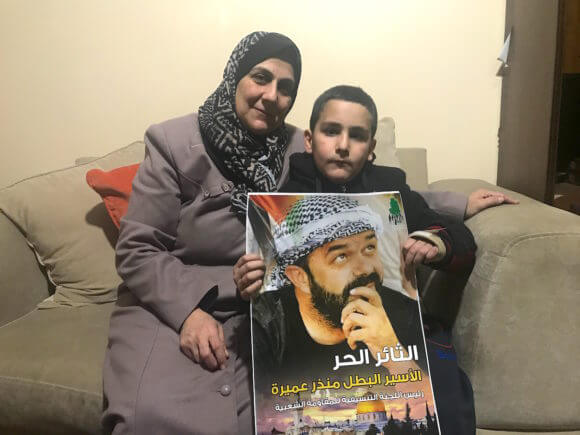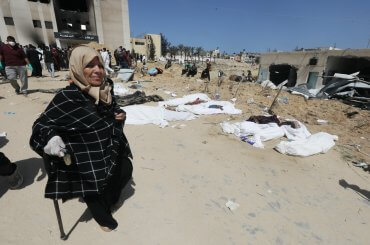Bethlehem — The Israeli military court at Ofer, which has over a 99% conviction rate, ruled on Tuesday to extend the detention of Palestinian activist Munther Amira until next Sunday pending further interrogation.
Amira, 47, the head of the Coordinator of the Popular Struggle Coordination Committee (PSCC) in the occupied West Bank, is well known and highly respected across the Palestinian territory and his home, the Aida refugee camp, for his nonviolent activism against the Israeli occupation.
Amira was arrested by Israeli forces on December 27 during a routine protest in front of Israel’s illegal separation wall in northern Bethlehem city, in the southern occupied West Bank.
Amira, along with dozens of Palestinians, were demonstrating against US President Donald Trump’s recognition of Jerusalem as Israel’s capital, and the arrest of 16-year-old activist Ahed al-Tamimi, who had been detained one week prior.
Video of Amira’s arrest shows the activist standing at the front of protests, holding a sign in support of Ahed al-Tamimi, when a group of Israeli officers ran out from the military base and grabbed him.
The Israeli prosecution has brought 12 charges against Amira, among them throwing stones, “organizing and participating in unpermitted marches,” and “throwing an incendiary device towards soldiers,” Jonathan Pollak, a member of Amira’s legal team, told Mondoweiss.
The latter charge regarding an “incendiary device,” Pollak added, is referring to allegations that Amira threw back a tear gas canister that was shot at him by Israeli forces while he was peacefully demonstrating.
The prosecution also attempted to charge Amira with “incitement” against Israel, though that charge was later dropped.
Sunday’s proceedings will hear the prosecution’s request to extend Amira’s remand until the end of his trial, a request that Pollak says will likely be granted.
“We have objected to the prosecution’s request and are trying our best to get Munther released,” Pollak told Mondoweiss, “but the chances of a fair trial are extremely thin.”
“It’s important to note that Israeli military courts have over a 99% conviction rate, and in Munther’s case, I think there is a clear political motivation here,” Jonathan said, “it’s obvious that Munther’s political activism is not tolerated by the Israeli regime.”
Pollak highlighted that all the charges being brought against Amira are based on testimonies of Israeli border police officers.
“There are cameras there that are positioned at all times on the area, yet they failed to produce any physical evidence — its all based on testimonies of border police officers who say they saw him doing these things.”
The pictures that the prosecution does have of Amira, Pollak added, simply depict the activist holding Palestinian flags and various signs.
“These military courts are not actual courts, they pretend to be, they are kangaroo courts. Palestinians are arrested by Israeli soldiers, prosecuted by soldiers, and sentenced by them.”
One of many Palestinian activists being targeted by Israel
The case against Amira is one all too familiar for his friend and fellow activist, human rights lawyer Farid al-Atrash.
Al-Atrash, a native of the southern West Bank city of Hebron, is also a member of the PSCC, and is currently facing multiple charges in Israeli military court similar to the ones being brought against Amira, including “participating in an illegal demonstration.”
His case has gained international attention, as he has been prosecuted alongside internationally renowned nonviolent activist Issa Amro, also a member of the PSCC, for their involvement in a peaceful protest in Hebron in 2016.
Amnesty International has denounced Israel’s case against al-Atrash and Amro as “baseless,” and has accused Israel of targeting the men because of their activism.
“What happened to me is exactly what is happening to Munther now,” al-Atrash told Mondoweiss, “they are targeting us for defending human rights and our rights as Palestinians under occupation.”
“Munther is a patriot, his life’s work is dedicated to defending the Palestinian people through nonviolent resistance against the occupation, against settlements, against wrongful arrest,” al-Atrash said, “and for no other reason except this, he was targeted by Israel.”
“The occupation has targeted the PSCC and its members, like myself, Munther, and Issa, because we are at the center of every protest, and this annoys them.”
“By targeting nonviolent activists like Munther, Israel is trying to send a message to all Palestinians who want to stand up against the occupation, that they are in danger,” al-Atrash said, highlighting the fact that he recently broke his leg after Israeli forces shot a rubber-coated steel bullet at him during a protest.
“I wasn’t throwing stones or holding anything that presented a threat or danger to them, but this is the occupation and this is what they do.”
“When they arrested Munther, he presented no danger to them in that moment and was not breaking any laws, but they arrested him anyways,” al-Atrash said, emphasizing that the demonstration took place on the main road in Bethlehem in ‘Area A,’ which is designated as being under full control of the Palestinian Authority (PA).
“They (Israeli soldiers) were on Palestinian territory. They are the ones who should request permission to be there, not us,” al-Atrash said, referring the Israeli charge against Amira of “participating in an illegal demonstration.”
This particular charge, which has been used in countless cases against Palestinian activists, falls under Israel’s Military Order 101, which Israeli human rights group B’Tselem has described as imposing “far-reaching restrictions on freedom of expression and the freedom to demonstrate, exceeding the cautious restrictions permitted by international and Israeli law.”
Military Order 101 states that Palestinian protesters must obtain an Israeli permit for any gathering or demonstration in the West Bank of more than 10 people.
“The obligation to obtain a permit for any gathering in the West Bank assumes that a group of ten persons presents an intrinsic and a priori danger to the public order – despite the fact that such a gathering does not require any special preparation on the part of the security forces,” B’Tselem said in a 2011 report.
“The order emphasizes the prohibition on political protest and prohibits the bearing of national symbols in the framework of a peaceful procession, or even on the level of the private individual. Such actions cannot be considered to constitute an attack on the military government and cannot be considered ones that by definition create a disturbance of public order.”
Al-Atrash says that despite the order being valid under Israeli law, “it clearly violates international law, and at the end of the day, international law should hold precedence over Israeli laws that are being enforced in an illegally occupied territory.”
‘Munther gives hope to the people’
Amira’s current detention is nothing new for the renowned peace activist’s wife and five children, who have seen him arrested and imprisoned countless times by Israel.
Sanaa, Amira’s wife, told Mondoweiss that while she wasn’t surprised, she was even more worried than she normally would get when her husband was detained in the past.
“Munther is sick. The day he went to the protest he had a fever, and was suffering from a series of health complications,” Sanaa said. “In the video and the pictures of that day, you can see he had no energy to even resist the arrest.”
Sanaa, a nurse, coordinated with her husband’s lawyers and doctors to present the court with his medical record in an attempt to get him the necessary medications.
“He was so sick that the doctors prescribed him antibiotics for one month, but despite showing this to the court, they only gave him medications two days ago.”
Responding to the question of why her husband took to the protest despite being seriously ill, Sanaa responded by saying: “this is Munther, no matter what circumstances, he will always go to protest against the occupation. My husband loves his country more than anything in this world.”
When describing her husband, Sanaa speaks of a dedicated patriot and a loving father and spouse. His work with the PSCC takes him to every corner of the West Bank, from the southern Hebron hills to Nablus, and occupies most of his nights and days.
“His life is difficult, and our lives are difficult, but at the end of the day when he comes home, even if it’s just for an hour, he gives all his time for us.”
“He takes the time to play with Mohammed, our youngest son, and sits and chat with our oldest daughter Ghaydaa,” Sanaa said. “He is a very kind, sympathetic man. He loves his kids, he loves his family, his mother, his sisters.”
“He loves his family so much, but he loves Palestine even more,” Sanaa said matter of factly, with a smile on her face.
When asked to sum up Munther’s personality and his role in his community, Sanaa recounted the time when Israeli forces confiscated the bicycles of some children in Aida camp.
The kids, disheartened and broken down, were heading back to their homes, completely hopeless.
“They thought they had to give up, that they had no choice, but Munther told them ‘no’, they have a voice and they have the right to use it.”
“He took the kids up to the military base in the camp and sat with them outside the wall for hours, chanting ‘we want our bicycles back,’ laughing and smiling with them, giving them hope, until eventually the soldiers gave them their bicycles back,” Sanaa said.
“Munther gives hope to the people, and teaches his children, the children of the camp, even the older the people, that as Palestinians we have rights, and we should not be scared to stand up for these rights.”
“I am sure that no matter how long they try to keep him in prison, it will not break his spirit. If anything, he will come out stronger and more active than ever before.”



Zionism two-step:
– Ask “Where is the Palestinian Gandhi?”
– Destroy him/her.
Shake it, Bibi!
that video is so damning. what bullies the soldiers are. the soldiers do not want peaceful opponents. they are mean people.
Many years ago – 30+? – I read David Grossman’s “The Yellow Wind.” Two images stayed with me:
Water shortages on one side of the Green Line, swimming pools and irrigated lawns on the other.
And a soldier confiscating a doll from a three-year-old girl at the border with Jordan. He took the trouble to take it apart, check it for explosives, put it back together — and then his commanding officer wouldn’t let him give the doll back to the child. I wonder: What happened to that girl? And I wonder, now: What happens to the toys these soldiers steal? Do they give them to their own children? What do their children think?